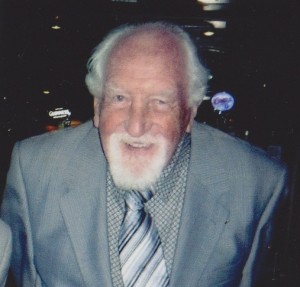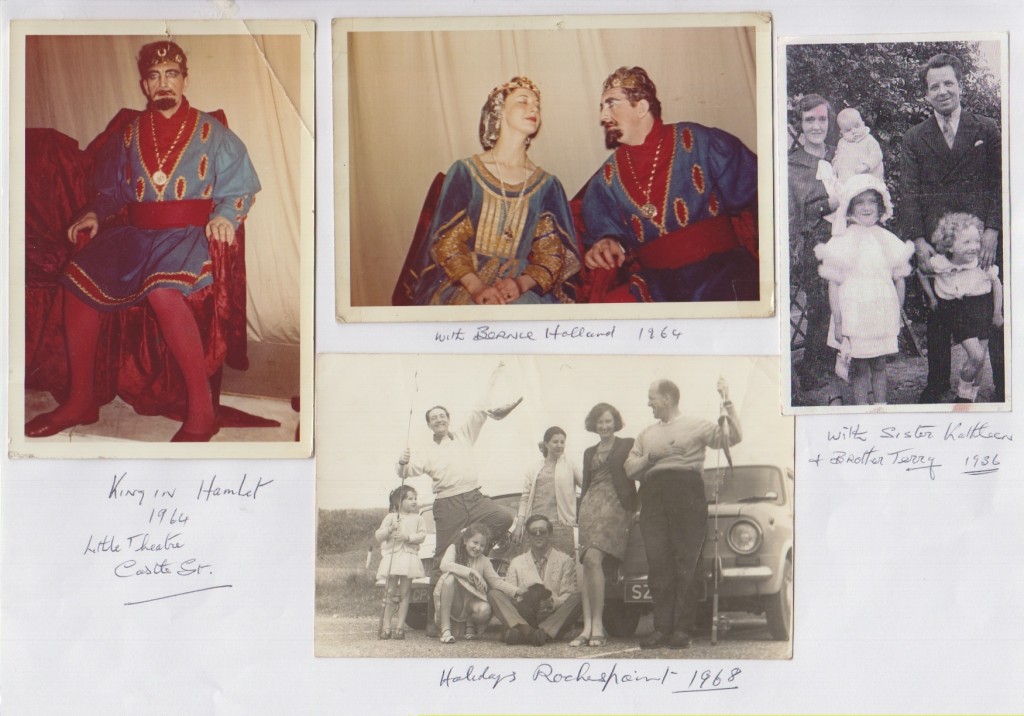Pearse Gunn

Pearse is very much a person of Cork City having been born and reared at the end of Barrack Street not far from the South Gate Bridge. It was inevitable that he would be educated in St. Nessan’s Christian Brothers School just around the corner from where he lived. He subsequently transferred to the North Monastery for secondary school and then to the School of Commerce.
On leaving school he found employment in Hipps Ltd., gentlemen’s outfitters, in Patrick’s Street. His manager there, Leo O’Neill, used to organise charity concerts and was very well known among Cork variety artists. Also O’Neill was the uncle of the internationally known photographer Terry O’Neill. This gave Pearse his first insight into ‘show business’. He applied himself well to his job and it wasn’t long before his artistic talents came to the fore. He transferred to the display staff and in that capacity he travelled all over Ireland and England mounting window displays in branches of the Company. After many years he returned to the retail side of the business and ended his career with the Company as manager of their Burtons Branch in Patrick Street.
After his retirement he didn’t lie on his laurels and opened his own sign designing business at his home on the Pouladuff Road. There was of course another side to Pearse and this was manifested at an early age. According to his mother this occurred after Mass one morning in the Holy Trinity Church. He was about four years old at the time and as she was saying a few prayers when Mass had ended, Pearse toddled off obviously bored with the inactivity and mounted the steps of the pulpit, turned to the few people left of the congregation and startled them by proclaiming “people do you love your God”. His mother, covered with embarrassment, quickly removed him from his pedestal but not for the last time. From that point on his theatrical career was launched. There was no doubt but that his two younger brothers and elder sister were well aware of his acting ability, as he grew older. It wasn’t long before he entered ‘Feis Matthew’ and took elocution lessons from a Mr. McCracken, attended James Stack classes in the School of Music also become a member of the ‘Well Players’ and Toastmasters.
Around that time he joined the ‘Loft’ and came into contact with Fr. Seamus O’Flynn, thereby becoming a life long devotee of Shakespeare and the ‘Priest’ himself. He immediately immersed himself in the methods of Fr. O’Flynn in such a way, that he was able to instil in himself an understanding of the range of human emotions crafted into the characters that inhabit the plays of Shakespeare. Above all Pearse understood where Fr. O’Flynn was driving. The attainment and portrayal of truth in acting, was the basis of his method and Pearse instinctively appreciated this. At the time of his joining the ‘Loft’ he was fortunate to be part of a group of very talented young Cork actors. Pearse along with these have became the mainstay of theatre in the City and beyond right down to the present day.
It is remarkable; that the most recent production of the Cork Shakespearean Company, ‘As You Like It’ gave Pearse the opportunity to reprise his first role of the vicar, ‘Sir Oliver Martext’, sixty-one years after he first played it in 1952. His career in theatre therefore spans a period of over sixty years. During that time he played in and directed a substantial number of the works of the ‘Bard’. Apart from Fr. O’Flynn and Eileen Curran his collaboration and friendship with retired English actor John Morley assisted him greatly in the successful move of the ‘Loft’ to the Opera House in 1971. Here he received outstanding notices and critiques for his direction of ‘Richard 111’ and ‘King Lear’. Also in the 1970s and ’80s he wrote and directrd the annual Passion Play in the Holy Trinity Church.
After the deaths of Fr. O’Flynn and his great friend Eileen Curran, he became the embodiment of what the ‘Loft’ was all about. Actors arrived from all over the City and County with some from further afield just to come under his influence and direction, which was always freely given. Thankfully this has continued to the present day and many actors owe their success to his coaching and tuition. There are of course many others who have benefited from his knowledge and wisdom. All who have come in contact with him have been touched by his humanity, the honesty of his acting advice and his ability to interpret the complexity of the range of emotions, which are encompassed in the plays of Shakespeare.

